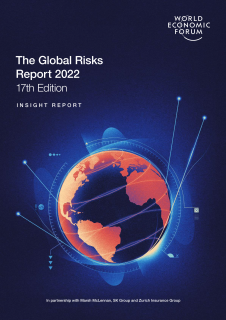
Climate change continues to be perceived as the gravest threat to humanity. Its effects are already manifesting rapidly in the form of droughts, fires, floods, resource scarcity and species loss, among other impacts.
Yet globally, the economic impacts of the COVID-19 crisis and weakened social cohesion may limit the financial and political capital available for stronger climate action. At COP26, the European Union, United Kingdom and United States were reluctant to commit to a formal climate finance target to respond to climate impacts in developing countries. Debt crises may reach a critical point in 3-5 years, even as public finance is needed to fund just, green transitions.
In this report, the WEF presents the results the results of the latest Global Risks Perception Survey (GRPS), followed by an analysis of key risks emanating from current economic, societal, environmental and technological tensions. Chapter 2 of the report focuses on the risks of a Disorderly Climate Transition. The report concludes with reflections on preparing national resilience ecosystems for future crises, drawing lessons from the last two years of the COVID-19 pandemic.
